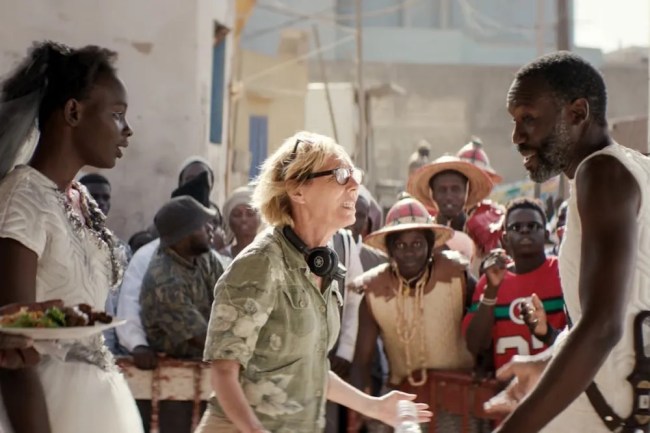Coined by American philosopher W.V. Quine, “Gavagai” is a nonsense word meant to convey the indeterminacy of translation. The classic example: A British ethnologist visits some “exotic” foreign land, where a speaker of the native tongue points to a rabbit and says “gavagai.” While the natural assumption would be that “gavagai” is the local word for “rabbit,” the reality is that “gavagai” could just as easily mean “food,” “pet,” “mammal,” or “we’re all vegans here.”
Some assumptions are more plausible than others, but the fact remains that no two people can ever perfectly understand one another, let alone two people from completely different backgrounds. Communication is miscommunication, and if that’s true of a single word, then it’s exponentially more so of an ancient play, or a modern adaptation of it, or — say — of a racist incident that occurs to the lead actor of a modern adaptation of an ancient play in the hours before the new “Medea” he stars in is set to premiere at the Berlin International Film Festival.
So goes the premise of Ulrich Köhler’s “Gavagai,” a patchy but provocative thought exercise of a movie that fittingly neglects to explain its title (hence the preamble here), which is all the better to let viewers arrive at their own interpretations. Loosely inspired by his experience shooting “Sleeping Sickness” (2011) in Cameroon, when the well-intentioned German director — sweating under the pressures of running a set in a distant country with a local crew — wound up “reproducing the neocolonial hierarchies and behavioral patterns that we address in the film” (as he puts it in the “Gavagai” press notes), this stilted meta-drama allows Köhler to more deliberately trace the inexorable tensions that underpin today’s globalized film trade.
Here, he recasts himself as a French director named Caroline (an extremely Claire Denis-coded Nathalie Richard), who seems a bit too headstrong and oblivious to appreciate why her Senegalese reimagining of Euripides’ tragedy — in which the titular child-murderer is an entitled white immigrant who’s reduced to refugee status after her native Black husband betrays her — could potentially reaffirm the same hierarchies of privilege that it hopes to address. Caroline is a headstrong liberal who’s doing what she can to push civilization forward according to her understanding of what that means, but flipping the script on racist stereotypes may not be the most effective way of dismantling them, especially when the process of doing so finds the director stranding her extras in the hot Dakar sun for 10 hours at a time while denying them access to the craft services tent.
To its credit, Köhler’s film is much less interested in wallowing in such archly observed (and self-exculpatory) ironies than it is in articulating how difficult they are to avoid in a world where nothing is a rabbit, and everything is “gavagai.” While there are several wry moments of movie-within-a-movie satire toward the start (Medea comes to shore on the bow of a speedboat, and Caroline is horrified to see that Medea’s dead children have been outfitted with life jackets for safety reasons), “Gavagai” soon keys into a wide variety of overlapping — and sometimes conflicting — realities about the process of exhuming an ancient text, most of which are more sober in tone.
For starters, Caroline projects her frustration onto her lead actress, Maja (Maren Eggert), who she argues is too bourgeois to play an outcast “savage” capable of killing her own kids. The director is unaware that Maja — who FaceTimes her husband and daughter back home in Berlin during her breaks on set — is secretly having an affair with the film’s Jason (“Sleeping Sickness” star Jean-Christophe Folly, wonderful as Nourou, a character who’s always taking uncertain shape of his burden), which hardly rises to the crime of homicide, but suggests that Caroline doesn’t perceive her cast as clearly as she might think.
She’s certainly oblivious to the anxieties that have confronted her leading man by virtue of his accepting a major role in this splashy European production. She’s blithely unaware that Nourou’s Senegalese identity is so threatened that he can only justify his part in the film by insisting that it’s a masterpiece, even if the frequent clips we see of the finished product make it look like a hodgepodge of all the worst ideas that Julie Taymor never had (jet skis can only add so much to a 2,500-year-old play).
Nourou’s awareness of his own “complicity” in the project — the uncertain degree to which he’s swallowing his doubts about the movie in order to enjoy the benefits of being in it — is left ambiguous, but other tensions produced by his performance are more evident on the surface. A high-status artist in the African city where “Medea” is shot, Nourou is forced to assume the role of barely tolerated outsider in the German city where the film is slated to premiere, a downshift in privilege that leads to a racist incident outside of the Berlin hotel where he’s staying for the festival. A hostile security guard treats Nourou with undue suspicion, questioning his right to enter the lobby of the Intercontinental; the actor is understandably irked by the encounter, but it’s Maja who sees it as a chance to perform her identity as a good white lady, and perhaps to openly defend the lover she’s otherwise ashamed to keep as a secret. It’s Maja who adopts the role of savior and insists that the security guard be fired.
This too is based on a real incident, as a bigoted staffer — maybe or maybe not at the Intercontinental — confronted Folly after the premiere of “Sleeping Sickness.” This is also a chance for Köhler to redress his reaction to the event, and to examine how his reflexive transformation into a white savior may have been more for his own benefit than anything else. Like so much of “Gavagai,” the encounter is filmed from a remove (and in this case additionally obfuscated by a glass door), which doesn’t approximate some kind of objectivity so much as it heightens our attention to the nature of perspective.
Once again, this story is not being told through the eyes of its victim, but through those of his director, and while “Gavagai” avoids any self-flagellating displays of white guilt, the film is only so interesting because Köhler is keenly aware that he’s at risk of repeating this cycle of moral relativism, and making the fact of his awareness more important than Folly’s experience of prejudice. Is the act of extrapolating that experience into a feature-length film meant to absolve Köhler of his embarrassment over how it played out in real life, or — by reducing a long-time collaborator to his role in a particularly dehumanizing moment — is the director further confining Folly to the limits of his neoliberal gaze?
These would be easy questions for Köhler to address on his own behalf, but “Gavagai” complicates them well beyond the yes/no binary (even if the film is weakened by its quasi-cartoonish portrait of Caroline’s blinkered privilege, which prevents her from displaying any trace of self-awareness). Every scene is relaxedly suffused with the tension between the limits of perspective and the empathy of storytelling, until the act of seeing becomes as problematized as the refusal to look, and the boundaries between reality and fiction grow as blurred as those between the various genres that “Gavagai” swirls into an unclassifiable sludge.
The last act of this movie becomes a ticking clock thriller set during the “Medea” premiere, by which point “Gavagai” has already refracted the dynamic between Köhler and his subject into an inescapable house of mirrors that’s less interesting for its reflections than it is for the parallax of considering them from different angles. Those angles can be too obtuse in the moments when they aren’t unavoidably acute, and I can’t help but wish that Köhler had jettisoned the unhelpful “Medea” flashbacks in favor of a more explicitly self-reflexive approach that elevated the “Sleeping Sickness” of it all from backstory to text. Still, “Gavagai” remains worthwhile because it constantly adds new dimensions to the question of who this — or any — film is “for” in a world where even the simplest gestures can be lost in translation, and every viewer is left to arrive at their own meaning.
Grade: B-
“Gavagai” premiered at the 2025 New York Film Festival. It is currently seeking U.S. distribution.
Want to stay up to date on IndieWire’s film reviews and critical thoughts? Subscribe here to our newly launched newsletter, In Review by David Ehrlich, in which our Chief Film Critic and Head Reviews Editor rounds up the best new reviews and streaming picks along with some exclusive musings — all only available to subscribers.



